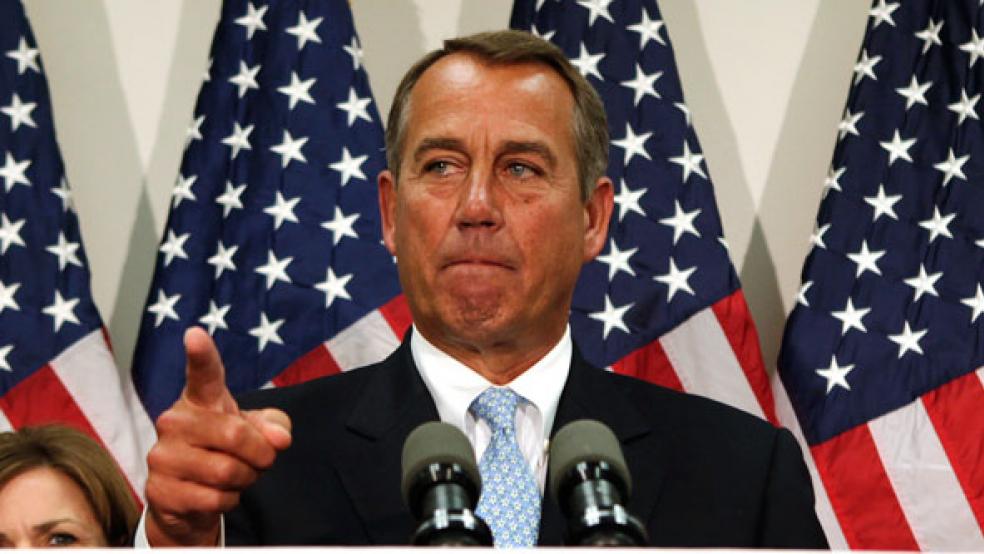So much for President Obama’s “charm offensive” to achieve a “Grand Bargain” budget deal with the GOP. And forget the Republicans’ promise of a return to “regular order” in which the Senate and House pass their respective budgets and then iron out their differences in an open meeting with a sense of bonhomie.

With pressure building after weeks of stalemate over spending bills and a new budget for the coming fiscal year, fireworks broke out on Thursday after House Speaker John Boehner (R-OH) accused Obama of threatening to shut down the government unless Republicans agree to tax and spending increases, something that the speaker says GOP lawmakers are inalterably opposed to. Boehner said Obama would veto all of the annual spending bills unless the two sides first agree to a broad budget and tax plan for fiscal 2014.
“When such delicate discussions are underway, the introduction by your administration of such an explosive new dynamic. . . needlessly injects a new element of uncertainty into our economy and further jeopardizes hope for a bipartisan agreement,” Boehner wrote.
“Your administration’s sudden demand to increase spending and taxes — yet again — or else shut down the government can only be described as reckless,” Boehner wrote to Obama.
RELATED: 3 BUDGET PROPOSALS, AND STILL ONE GIANT IMPASSE
The Office of Management and Budget issued a blanket veto threat late Monday in response to two spending bills that cleared the House this week that would fund veterans’ affairs and military construction and fund the Department of Homeland Security. Both emerged from the House Appropriations Committee with spending levels approved in a budget plan drafted by House Budget Committee Chairman Paul Ryan (R-Wis.) that calls for the sequester to remain in place through the coming fiscal year.
Obama’s advisers dispute the idea that the president’s latest threat amounted to a possible shutdown, instead insisting that the veto was meant to set up their argument that the current spending plans advancing in the House would gut key domestic programs, the Washington Post reported.
“Obviously, he’s not threatening a government shutdown,” White House Press Secretary Jay Carney told reporters this week, adding, “It’s a statement about how we should responsibly fund our government in ways that keep the commitments that Congress has made in the past to the American people.”
The House appears determined to barrel ahead and pass new spending bills for government agencies and programs before the House and Democratic controlled Senate have had a chance to work out the many differences in their budget plans for the coming fiscal year. After berating the Senate for failing to pass a budget in the past three years, the Senate went ahead this spring and passed a $3.6 trillion budget blueprint, vastly different in priorities and spending levels than the House-passed budget.
But now the Republicans’ posturing has boomeranged. That’s because House and Senate Republicans have no interest in negotiating a final budget deal that includes another tax hike or raising the debt ceiling. Ryan and Boehner have fended off repeated Democratic calls for the two sides to appoint negotiators and officially begin talks.
They argue that it doesn’t make sense to begin formal talks until the two parties can informally agree to a budget "framework" that would be acceptable to rank-and-file Republicans – and that this would be in keeping with “regular order” procedures during past budget talks between Democrats, Republicans and the White House.
Senate Budget Committee Chairwoman Patty Murray (D-WA) was miffed by the suggestion in Boehner’s letter that there was anything “regular” about the runaround that she and other Senate and House Democratic budget leaders were getting from Ryan and the Republicans. She has tried and failed a dozen times to convince the Republicans to appoint conferees to begin negotiating a final budget and tax deal before the fall.
“I want to go to conference,” she told reporters yesterday. That's what regular order is. It is the next step. That is how we will get to a bipartisan budget as quickly as possible.”
Murray said the Republicans are refusing to go to conference because “they want to force a manufactured crisis over the debt limit this fall,” when the Treasury once again will exhaust its borrowing authority. The Republicans used the debt ceiling as leverage during critical budget talks in 2011, but Obama has vowed to never again allow the GOP to use the debt ceiling as a bargaining chip.





